leave+宾语+宾补的用法
leave+宾语+宾补的用法

创作编号:GB8878185555334563BT9125XW创作者:凤呜大王*“leave+宾语+宾补”(即leave复合结构)的用法总结Leave+宾语+宾语补足语,其中宾语补足语这一成分可以由过去分词、现在分词、形容词、副词、介词的复合结构等来充当,意思是”使.....处于…..状态;听任;让”现分述如下:1.由过去分词来充当宾语补足语:leave sth/sb done,常用来表示宾语所处的状态或表示动作已经完成。
(宾语和宾补被动关系)(1)He got up slowly, leaving the lunch unfinished.(2)Did you leave the doors and windows firmly fastened?(3)I can't leave such an important matter undone/unfinished. 我不能让这样一件重要的事半途而废。
The moving story left him unmoved. 他对这个令人激动的故事竟然无动于衷。
2.由现在分词来充当宾语补足语:leave sb/sth doing,常用来表示使某人或某物一直做某事(宾语和宾补被动关系).waiting outside in the rain.(2)They went off together and left me sitting there.(3)We left him painting the gate. △可用于被动语态:The papers were left lying around.3.由形容词来充当宾语补足语:(1)You’d better leave thedrawing-room door open.(2)His illness has left him weak.△可用于被动语态:The window was left open.4.由副词作宾语补足语(1)What has left him away for so long?什么事使他离开了这么长时间?(2)We can’t leave the light on when leaving.5. 由介词的复合结构充当宾语补足语:(1)Leave him in peace!(2)His illness left him with a weak heart.(3)You’ve left her name off the list.(4)This matter left her without a way of hope. 这件事使她没有一丝一毫的希望。
leave的六种宾补结构

leave的六种宾补结构Leave的六种宾补结构Leave是一个常用的动词,它可以用来表示离开某个地方或情况。
在句子中,leave可以带有宾补结构,用来进一步说明离开的方式、目的或结果。
本文将介绍leave的六种常见宾补结构,分别是leave sb. + adj., leave sb. + n., leave sb. + to do sth., leave sb. + v.-ing, leave sb. + adv. 和 leave sb. + prep. phrase。
一、leave sb. + adj.(使某人处于某种状态)这种结构表示离开后留下某人处于某种状态,常用于描绘情感或心理状态。
例如:1. I was deeply moved by the movie. It left me speechless.(那部电影让我深受感动,让我无言以对。
)2. The news of her promotion left me envious.(她晋升的消息让我羡慕不已。
)二、leave sb. + n.(使某人处于某种状态)这种结构表示离开后留下某人处于某种状态,常用于描述具体的情况或感受。
例如:1. The loud noise left me with a headache.(那嘈杂的声音让我头疼不已。
)2. The unexpected rainstorm left us in a mess.(突如其来的暴雨让我们一片混乱。
)三、leave sb. + to do sth.(让某人去做某事)这种结构表示离开时将某人交给他人或自己去做某事。
例如:1. My boss left me to handle the project on my own.(我的老板让我自己负责处理这个项目。
)2. She left her children to play in the park while she went shopping.(她让孩子们在公园里玩耍,自己去购物。
leave 宾语 宾补

Leave+宾语+宾补教材原句:They can destroy houses,but leave the furniture inside exactly where it was. Leave the furniture inside...是leave+宾语+宾补的结构,表示“使...处于某种状态”。
1.leave+宾语+形容词2.leave+宾语+分词现在分词:宾语与宾补之间是主动关系过去分词:宾语与宾补之间是被动关系3.leave+宾语+不定式4.leave+宾语+名词5.leave+宾语+介词短语6.leave+宾语+where引导的地点状语从句/as引导的方式状语从句单句填空①On hearing the news, she rushed out without hesitation and disappearedin the distance, leaving her toy___lying_____ (lie)on the desk.②Having finished reading the book, he left it____where___ it was.③They covered him with a blanket, only leaving his eyes__exposed_____ (expose).完成句子④_Leave your kids as they are_and they will grow in a healthy way.让你的孩子顺其自然,他们会健康地成长。
⑤His parents died in the Pakistan earthquake,_leaving him an orphan_ . 他的父母在巴基斯坦地震中去世了,留下他成为一名孤儿。
leave宾语宾补的用法

“leave+宾语+宾补”(即leave复合结构)的用法总结Leave+宾语+宾语补足语,其中宾语补足语这一成分可以由过去分词、现在分词、形容词、副词、介词的复合结构等来充当,意思是”使.....处于…..状态;听任;让”现分述如下:1.由过去分词来充当宾语补足语:leave sth/sb done,常用来表示宾语所处的状态或表示动作已经完成。
(宾语和宾补被动关系)(1)He got up slowly, leaving the lunch unfinished.(2)Did you leave the doors and windows firmly fastened?(3)I can't leave such an important matter undone/unfinished. 我不能让这样一件重要的事半途而废。
The moving story left him unmoved. 他对这个令人激动的故事竟然无动于衷。
2.由现在分词来充当宾语补足语:leave sb/sth doing,常用来表示使某人或某物一直做某事(宾语和宾补被动关系).(1)Don’t leave her waiting outside in the rain.(2)They went off together and left me sitting there.(3)We left him painting the gate.△可用于被动语态:The papers were left lying around.3.由形容词来充当宾语补足语:(1)You’d better leav e the drawing-room door open.(2)His illness has left him weak.△可用于被动语态:The window was left open.4.由副词作宾语补足语(1)What has left him away for so long?什么事使他离开了这么长时间?(2)We can’t leave the light on when leaving.5. 由介词的复合结构充当宾语补足语:(1)Leave him in peace!(2)His illness left him with a weak heart.(3)You’ve left her name off the list.(4)This matter left her without a way of hope. 这件事使她没有一丝一毫的希望。
leave+宾语+宾补
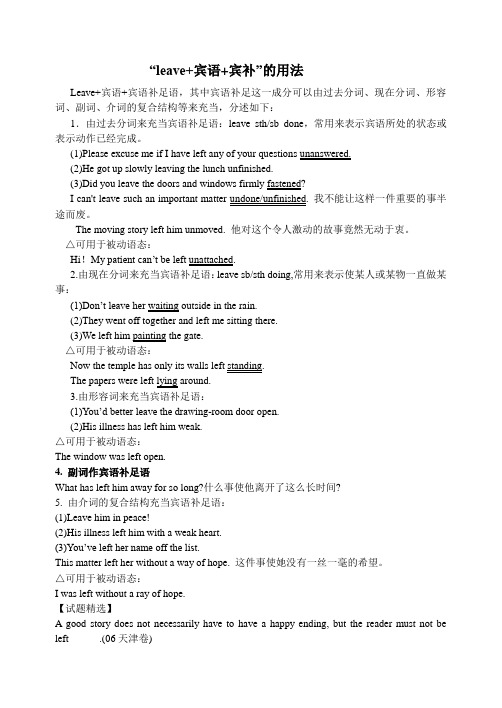
“leave+宾语+宾补”的用法Leave+宾语+宾语补足语,其中宾语补足这一成分可以由过去分词、现在分词、形容词、副词、介词的复合结构等来充当,分述如下:1.由过去分词来充当宾语补足语:leave sth/sb done,常用来表示宾语所处的状态或表示动作已经完成。
(1)Please excuse me if I have left any of your questions unanswered.(2)He got up slowly leaving the lunch unfinished.(3)Did you leave the doors and windows firmly fastened?I can't leave such an important matter undone/unfinished. 我不能让这样一件重要的事半途而废。
The moving story left him unmoved. 他对这个令人激动的故事竟然无动于衷。
△可用于被动语态:Hi!My patient can’t be left unattached.2.由现在分词来充当宾语补足语:leave sb/sth doing,常用来表示使某人或某物一直做某事:(1)Don’t leave her waiting outside in the rain.(2)They went off together and left me sitting there.(3)We left him painting the gate.△可用于被动语态:Now the temple has only its walls left standing.The papers were left lying around.3.由形容词来充当宾语补足语:(1)You’d better leave the drawing-room door open.(2)His illness has left him weak.△可用于被动语态:The window was left open.4. 副词作宾语补足语What has left him away for so long?什么事使他离开了这么长时间?5. 由介词的复合结构充当宾语补足语:(1)Leave him in peace!(2)His illness left him with a weak heart.(3)You’ve left her name off the list.This matter left her without a way of hope. 这件事使她没有一丝一毫的希望。
使役动词及keep leave等用法

使役动词及keep leave等用法
使役动词是指表示使、令、让等意义的动词,常见的使役动词有make、let、have等。
这些动词可以与不带to的不定式构成复合宾语,表示让某人为另一人做某事。
关于keep、leave的用法,它们通常与表示状态或结果的状语从句连用,
表示“保持”、“留下”的状态或结果。
- keep的用法:
- keep+宾语+宾补
- 宾语是不定代词时,只能用it作形式主语,而不能用其他代词。
- keep+形容词,表示保持某种状态。
- keep+副词,表示保持某种状态。
- keep+介词短语,表示保持某种状态。
- leave的用法:
- leave+宾语+宾补,表示使某人/某物处于某种状态。
- leave+宾语+地点/时间,表示留下、离开某个地方或时间。
- leave+宾语+不定式,表示让某人做某事。
- leave+宾语+现在分词,表示让某人正在做某事。
- leave+宾语+过去分词,表示让某人被某事所影响。
leave make keep get have +宾语宾补

leave make keep get have +宾语宾补
以下是leave、make、keep、get、have作为动词,后面跟宾语和宾补的一些常见的短语:
- leave sb./sth. + 宾补:离开某人或某物
- make sb./sth. + 宾补:制作某人或某物
- keep sb./sth. + 宾补:保持某人或某物
- get sb./sth. + 宾补:得到某人或某物
- have sb./sth. + 宾补:拥有某人或某物
例如:
- He left his job and started a new career.(他离开了他的工作开始了新的职业生涯。
)
- She made a delicious cake for her birthday.(她为她生日做了一个美味的蛋糕。
)
- The cat kept me awake last night.(猫昨晚让我失眠了。
)
- I got a new phone as a gift from my friend.(我从我的朋友那里得到了一部新手机。
)
- She has a beautiful garden in her backyard.(她的后院有一个美丽的花园。
)。
leave加宾语加宾补的用法
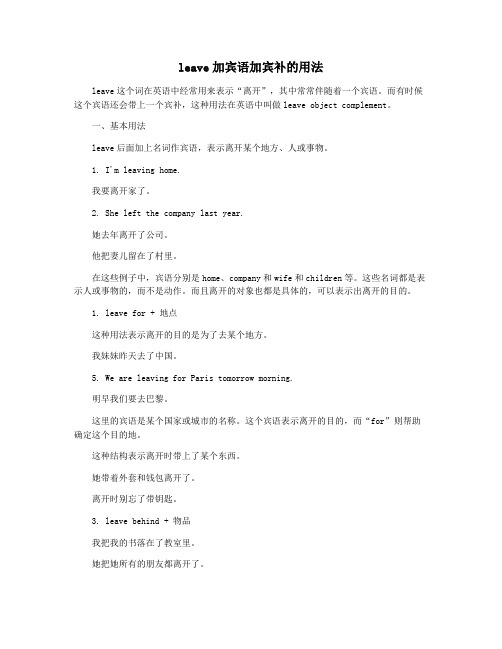
leave加宾语加宾补的用法leave这个词在英语中经常用来表示“离开”,其中常常伴随着一个宾语。
而有时候这个宾语还会带上一个宾补,这种用法在英语中叫做leave object complement。
一、基本用法leave后面加上名词作宾语,表示离开某个地方、人或事物。
1. I'm leaving home.我要离开家了。
2. She left the company last year.她去年离开了公司。
他把妻儿留在了村里。
在这些例子中,宾语分别是home、company和wife和children等。
这些名词都是表示人或事物的,而不是动作。
而且离开的对象也都是具体的,可以表示出离开的目的。
1. leave for + 地点这种用法表示离开的目的是为了去某个地方。
我妹妹昨天去了中国。
5. We are leaving for Paris tomorrow morning.明早我们要去巴黎。
这里的宾语是某个国家或城市的名称。
这个宾语表示离开的目的,而“for”则帮助确定这个目的地。
这种结构表示离开时带上了某个东西。
她带着外套和钱包离开了。
离开时别忘了带钥匙。
3. leave behind + 物品我把我的书落在了教室里。
她把她所有的朋友都离开了。
这个宾补可以是一个具体的物品,也可以是一个抽象的概念。
有时候,leave后面还可以加上一个形容词,表示离开时的状态或某种感觉。
我离开时感到很生气。
四、leave加动词不定式的用法我的朋友离开了,去坐火车。
我要离开了,开始新的生活。
这个宾补通常是动词的原形形式,这样可以准确传达出离开的目的或者愿望。
总结leave加宾语加宾补的用法比较灵活,可以根据不同的语境来做出调整。
在表达的过程中,需要注意宾语的类型、目的地、带上的物品、留下的物品,还有离开的状态和意愿等等。
只要掌握好这些要点,就可以很好地运用这种结构,用简洁而准确的语言来传达我们的意思。
leave句型结构
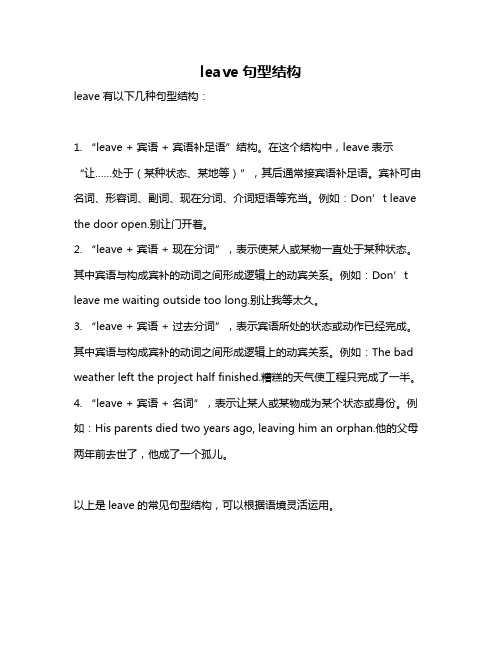
leave句型结构
leave有以下几种句型结构:
1. “leave + 宾语 + 宾语补足语”结构。
在这个结构中,leave表示“让……处于(某种状态、某地等)”,其后通常接宾语补足语。
宾补可由名词、形容词、副词、现在分词、介词短语等充当。
例如:Don’t leave the door open.别让门开着。
2. “leave + 宾语 + 现在分词”,表示使某人或某物一直处于某种状态。
其中宾语与构成宾补的动词之间形成逻辑上的动宾关系。
例如:Don’t leave me waiting outside too long.别让我等太久。
3. “leave + 宾语 + 过去分词”,表示宾语所处的状态或动作已经完成。
其中宾语与构成宾补的动词之间形成逻辑上的动宾关系。
例如:The bad weather left the project half finished.糟糕的天气使工程只完成了一半。
4. “leave + 宾语 + 名词”,表示让某人或某物成为某个状态或身份。
例如:His parents died two years ago, leaving him an orphan.他的父母两年前去世了,他成了一个孤儿。
以上是leave的常见句型结构,可以根据语境灵活运用。
leave宾补的几种情况
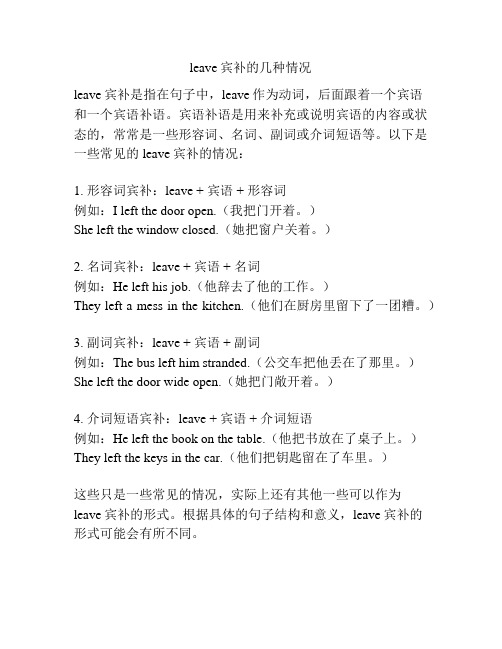
leave宾补的几种情况
leave宾补是指在句子中,leave作为动词,后面跟着一个宾语
和一个宾语补语。
宾语补语是用来补充或说明宾语的内容或状态的,常常是一些形容词、名词、副词或介词短语等。
以下是一些常见的leave宾补的情况:
1. 形容词宾补:leave + 宾语 + 形容词
例如:I left the door open.(我把门开着。
)
She left the window closed.(她把窗户关着。
)
2. 名词宾补:leave + 宾语 + 名词
例如:He left his job.(他辞去了他的工作。
)
They left a mess in the kitchen.(他们在厨房里留下了一团糟。
)
3. 副词宾补:leave + 宾语 + 副词
例如:The bus left him stranded.(公交车把他丢在了那里。
)She left the door wide open.(她把门敞开着。
)
4. 介词短语宾补:leave + 宾语 + 介词短语
例如:He left the book on the table.(他把书放在了桌子上。
)They left the keys in the car.(他们把钥匙留在了车里。
)
这些只是一些常见的情况,实际上还有其他一些可以作为
leave宾补的形式。
根据具体的句子结构和意义,leave宾补的
形式可能会有所不同。
leave宾补的几种情况

leave宾补的几种情况一、以leave宾补的情况一:leave + 名词宾语leave可以用来表示某人离开某地或将某物留在某处。
在这种情况下,leave后面可以跟名词宾语,表示被离开的地点或被留下的物品。
例如:1. He left his bag on the bus.(他把包忘在公交车上了。
)2. Don't forget to leave a note on the table.(别忘了在桌子上留个便条。
)3. She left her phone at home.(她把手机落在家里了。
)二、以leave宾补的情况二:leave + 宾补(动词不定式)leave还可以与动词不定式构成宾补,表示某人离开某地或将某事交给他人去做。
例如:1. He left to catch the train.(他离开去赶火车了。
)2. Don't leave your homework to the last minute.(别把作业拖到最后一刻。
)3. She left me to deal with the problem on my own.(她让我自己处理这个问题。
)三、以leave宾补的情况三:leave + 宾补(形容词)leave还可以与形容词构成宾补,表示某人离开后给人留下某种感觉或状态。
例如:1. The movie left me feeling inspired.(这部电影让我感到鼓舞。
)2. His words left her speechless.(他的话让她无言以对。
)3. The news left us all shocked.(这个消息让我们都感到震惊。
)四、以leave宾补的情况四:leave + 宾补(副词)leave还可以与副词构成宾补,表示某人离开后以某种方式或状态。
例如:1. He left quietly, without saying a word.(他悄悄地离开了,一言不发。
leave make keep get have +宾语宾补

leave make keep get have +宾语宾补离开(leave)、制造(make)、保留(keep)、得到(get)、拥有(have)这五个动词后面可以跟宾语宾补的情况如下:一、离开(leave):1.1 leave +宾语+ to +动词原形:表示留给某人/某物做某事。
例句:I left the money to him to buy some food.我把钱留给了他买食物。
1.2 leave +宾语+ adj.:表示使某人/某物处于某种状态。
例句:She left the door open.她把门留着开着。
1.3 leave +宾语+ n.:表示遗留某物给某人。
例句:He left his house to his son.他把房子遗留给了他的儿子。
1.4 leave +宾语+ for +地点:表示离开某地去往另一个地点。
例句:They left for London yesterday.他们昨天离开去了伦敦。
二、制造(make):2.1 make +宾语+动词原形:表示使某人/某物做某事。
例句:She made the children clean the room.她让孩子们打扫了房间。
2.2 make +宾语+ adj.:表示使某人/某物处于某种状态。
例句:The loud noise made the baby cry.大声的噪音害得宝宝哭了。
2.3 make +宾语+ n.:表示制作某物。
例句:They made a cake for the party.他们为聚会做了一个蛋糕。
2.4 make +宾语+ into + n.:表示将某物制造成为另一种物品。
例句:He made the clay into a sculpture.他把黏土制作成了雕塑。
三、保留(keep):3.1 keep +宾语+ adj.:表示保持某人/某物处于某种状态。
例句:Keep the door closed, please.请把门关好。
(完整版)leave+宾语+宾补的用法

“leave+宾语+宾补”(即leave复合结构)的用法总结Leave+宾语+宾语补足语,其中宾语补足语这一成分可以由过去分词、现在分词、形容词、副词、介词的复合结构等来充当,意思是”使.....处于…..状态;听任;让”现分述如下:1.由过去分词来充当宾语补足语:leave sth/sb done,常用来表示宾语所处的状态或表示动作已经完成。
(宾语和宾补被动关系)(1)He got up slowly, leaving the lunch unfinished.(2)Did you leave the doors and windows firmly fastened?(3)I can't leave such an important matter undone/unfinished. 我不能让这样一件重要的事半途而废。
The moving story left him unmoved. 他对这个令人激动的故事竟然无动于衷。
2.由现在分词来充当宾语补足语:leave sb/sth doing,常用来表示使某人或某物一直做某事(宾语和宾补被动关系).(1)Don’t leave her waiting outside in the rain.(2)They went off together and left me sitting there.(3)We left him painting the gate.△可用于被动语态:The papers were left lying around.3.由形容词来充当宾语补足语:(1)You’d better leav e the drawing-room door open.(2)His illness has left him weak.△可用于被动语态:The window was left open.4.由副词作宾语补足语(1)What has left him away for so long?什么事使他离开了这么长时间?(2)We can’t leave the light on when leaving.5. 由介词的复合结构充当宾语补足语:(1)Leave him in peace!(2)His illness left him with a weak heart.(3)You’ve left her name off the list.(4)This matter left her without a way of hope. 这件事使她没有一丝一毫的希望。
leave+宾语+宾补的用法(最新整理)
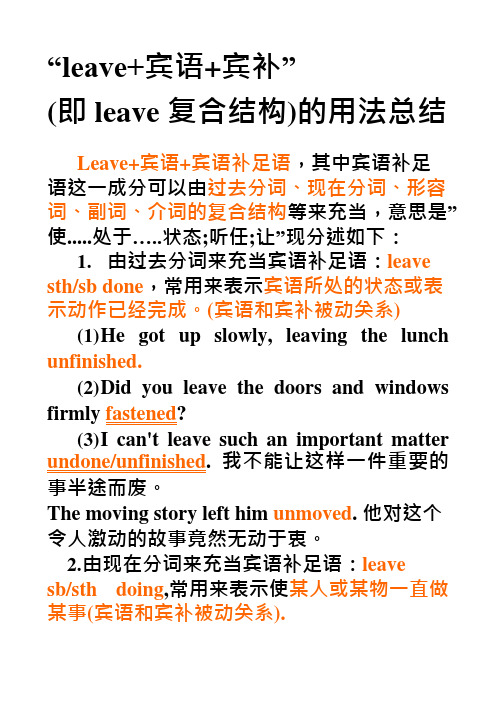
“leave+宾语+宾补”(即leave 复合结构)的用法总结Leave+宾语+宾语补足语,其中宾语补足语这一成分可以由过去分词、现在分词、形容词、副词、介词的复合结构等来充当,意思是” 使.....处于…..状态;听任;让”现分述如下:1.由过去分词来充当宾语补足语:leave sth/sb done,常用来表示宾语所处的状态或表示动作已经完成。
(宾语和宾补被动关系)(1)H e got up slowly, leaving the lunch unfinished.(2)D id you leave the doors and windows firmly fastened?(3)I can't leave such an important matter undone/unfinished. 我不能让这样一件重要的The moving story left him unmoved. 他对这个令人激动的故事竟然无动于衷。
2.由现在分词来充当宾语补足语:leavesb/sth doing,常用来表示使某人或某物一直做某事(宾语和宾补被动关系).(1)D on’t leave her waiting outside in the rain.(2)T hey went off together and left me sitting there.(3)W e left him painting the gate.△可用于被动语态:lying around.3.由形容词来充当宾语补足语:(1)Y ou’d better leave the drawing-room door open.(2)H is illness has left him weak.△可用于被动语态:The window was left open.4.由副词作宾语补足语(1)W hat has left him away for so long?什么事使他离开了这么长时间?(2)W e can’t leave the light on when leaving.5.由介词的复合结构充当宾语补足语:(1)L eave him in peace!(2)H is illness left him with a weak heart.(3)You’ve left her name off the list.(4)This matter left her without a way of hope.这件事使她没有一丝一毫的希望。
leave后接非谓语动词做宾补的用法

leave后接非谓语动词做宾补时,意为“使……处于某种状态”。
leave sb. doing sth. 让某人一直做某事(宾语与宾补之间是逻辑上的主动关系,表示动作正在进行);leavesth. undone 留下某事未做(宾语与宾补之间是逻辑上的被动关系,表示被动和完成,一般以undone, unfinished, unsettled, untouched为多);
leave sb. to do sth. 留下某人做某事(不定时表示将来的动作)
leavesth. to be done 留下某事要做(不定时表示将来的动作)
e.g. It’s wrong of you to leave the machine running.你让机器一直开着是不对的。
(主动,正在进行)The guests left most of the dishes untouched, because they didn't taste delicious.
大部分菜客人们没有动,因为它们尝起来不可口。
(被动,完成)
He left, leaving me to do all the rest work. (主动,将来)
We hurriedly ended our meeting, leaving many problems to be settled.
我们匆匆忙忙地结束了会议,留下了很多问题等待解决。
(被动,将来)。
leave加宾语加宾补用法六种

leave加宾语加宾补用法六种
1. leave + 宾语 + 形容词/副词
例句:He left the room clean and tidy.(他离开时把房间打扫得干净整洁。
)
2. leave + 宾语 + 名词
例句:Don't forget to leave a tip for the waiter.(别忘了给服务员留下小费。
)
3. leave + 宾语 + 不定式
例句:She left her husband to find a new job.(她离开丈夫去找新工作。
)
4. leave + 宾语 + 名词/代词 + 形容词/副词
例句:We left our children alone at home.(我们把孩子们一个人留在家里了。
)
5. leave + 宾语 + 名词/代词 + 不定式
例句:I left my keys with my neighbor to water the plants.(我把钥匙留给了邻居去给植物浇水。
)
6. leave + 宾语 + 名词/代词 + 宾补
例句:They left him no choice but to accept the offer.(他们没有给他别的选择,只能接受这个提议。
)。
leave的宾补结构
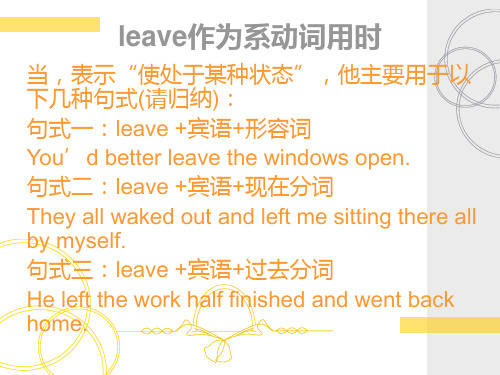
leave waiting • 2. Don’t ______him______(等着)outside in the train.
• 3.He would like to leave _____the apple ______(未 uneaten 吃完的)up and threw away. • 4.Parents always leave ______him _____ ______ to do (让自己做) • 5.______the expense______, (费用多少不说) Leaving aside do we actually need a second car? 6.You had better leave ______him____the corner in (在角落里)
leave作为系动词用时
当,表示“使处于某种状态”,他主要用于以 下几种句式(请归纳): 句式一:leave +宾语+形容词 You’d better leave the windows open. 句式二:leave +宾语+现在分词 They all waked out and left me sitting there all by myself. 句式三:leave +宾语+过去分词 He left the work half finished and went back home.
• 此外,后面还可以跟表示地点和方式的状语从句 • You should make it a rule to leave things where you can find them again. • 一.完成句子 • Even though it is spring, you had better _____the windows closed ________(让窗子关;宾语+不定式 • She left her mother to take care of her baby. • 句式五:leave +宾语+介词短语 • You must not leave them in the dark about it . • 句式六:leave +宾语+副词 • You may leave the radio on
leave加宾语加宾补用法六种

leave加宾语加宾补用法六种
留下:leave + 宾语 + 宾补
例如:
1. 他把门打开,留下了一个空位。
(留下了一个空位是宾补)
2. 妈妈让我留下了一个礼物。
(留下了一个礼物是宾补)
使…成为:leave + 宾语 + 宾补
例如:
1. 这个节目太激动人心了,留下了我深刻的印象。
(留下了我深刻的印象是宾补)
2. 这部电影给观众留下了一个难忘的故事。
(留下了一个难忘的故事是宾补)
使…处于某种状态:leave + 宾语 + 宾补
例如:
1. 他的话让我们留下了疑惑。
(留下了疑惑是宾补)
2. 那个事情让我留下了困惑的状态。
(留下了困惑的状态是宾补)
原封不动地保留:leave + 宾语 + 宾补 + to + 宾语补足语
例如:
1. 他将那个房间保留了下来,用于存放旧书。
(保留了下来,用于存放旧书是宾补)
将…留给:leave + 宾语 + to + 宾补
例如:
1. 他留下了一些钱给孙子们。
(留下了一些钱给孙子们是宾补)
2. 她把工作留给了下一个人。
(留给了下一个人是宾补)
托付给:leave + 宾语 + to + 宾补
例如:
1. 她将书册留给了我。
(留给了我是宾补)
2. 我把这个任务留给了你。
(留给了你是宾补)。
leave+宾语+宾补的用法

“leave+宾语+宾补”(即leave复合结构)的用法总结之欧侯瑞魂创作Leave+宾语+宾语补足语,其中宾语补足语这一成分可以由过去分词、现在分词、形容词、副词、介词的复合结构等来充当,意思是”使.....处于…..状态;听任;让”现分述如下:1.由过去分词来充当宾语补足语:leave sth/sb done,经常使用来暗示宾语所处的状态或暗示动作已经完成。
(宾语和宾补主动关系)(1)He got up slowly, leaving the lunch unfinished.(2)Did you leave the doors and windows firmly fastened?(3)I can't leave such an important matter undone/unfinished. 我不克不及让这样一件重要的事中途而废。
The moving story left him unmoved. 他对这个令人激动的故事竟然无动于衷。
2.由现在分词来充当宾语补足语:leave sb/sth doing,经常使用来暗示使某人或某物一直做某事(宾语和宾补主动关系).waiting outside in the rain.(2)They went off together and left me sitting there.(3)We left him painting the gate.△可用于主动语态:The papers were left lying around.形容词来充当宾语补足语:(1)You’d better leave the dr awing-room door open.(2)His illness has left him weak.△可用于主动语态:The window was left open.副词作宾语补足语(1)What has left him away for so long?什么事使他离开了这么长时间?(2)We can’t leave the light on when leaving.5.由介词的复合结构充当宾语补足语:(1)Leave him in peace!(2)His illness left him with a weak heart.(3)You’ve left her name off the list.(4)This matter left her without a way of hope. 这件事使她没有一丝一毫的希望。
- 1、下载文档前请自行甄别文档内容的完整性,平台不提供额外的编辑、内容补充、找答案等附加服务。
- 2、"仅部分预览"的文档,不可在线预览部分如存在完整性等问题,可反馈申请退款(可完整预览的文档不适用该条件!)。
- 3、如文档侵犯您的权益,请联系客服反馈,我们会尽快为您处理(人工客服工作时间:9:00-18:30)。
The movingstory left himunmoved.他对这个令人激动的故事竟然无动于衷。
2.由现在分词来充当宾语补足语:leave sb/sth doing,常用来表示使某人或某物一直做某事(宾语和宾补被动关系).
3.由形容词来充当宾语补足语:
(1)You’dbetter leavethe drawing-room dooropen.
(2)Hisillnesshaslefthimweak.
△可用于被动语态:
Thewindow wasleft open.
4.由副词作宾语补足语
(1)What haslefthimawayfor so long?什么事使他离开了这么长时间?
3.John rushed outin a hurry,______the door _______.
A.leaving, unlocked B. leaving, unlocking C.left,unlockedD.toleave, unlocking
4.Don’tleave the water______ whileyou brushyour teeth.
△可用于被动语态:
I wasleftwithout a ray of hope.
5.由名词作宾语补足语
The earthquakelefthim an orphan.
【试题精选】
1.Agoodstorydoes notnecessarilyhavetohaveahappyending,but thereadermust notbe left______.(06天津卷)
A. runningB. run
C. beingrunD. torun
答案:ADAA
1.由过去分词来充当宾语补足语:leave sth/sbdone,常用来表示宾语所处的状态或表示动作已经完成。(宾语和宾补被动关系)
(1)Hegotup slowly,leaving thelunchunfinished.
(2)Didyou leave thedoors and windows firmlyfastened?
leave+宾语+宾补的用法
———————————————————————————————— 作者:
———————————————————————————————— 日期:
“leave+宾语+宾补”(即leave复合结构)的用法总结
Leave+宾语+宾语补足语,其中宾语补足语这一成分可以由过去分词、现在分词、形容词、副词、介词的复合结构等来充当,意思是”使.....处于…..状态;听任;让”现分述如下:
(2)Wecan’tleavethelightonwhenleaving.
5.由介词的复合结构充当宾语补足语:
(1)Leavehiminpeace!
(2)Hisillness lefthimwithaweak heart.
(3)You’velefthernameoff the list.
(4)Thismatter leftherwithouta way of hope.这件事使她没有一丝一毫的希望。
(1)Don’tleave herwaitingoutside intherain.
(2)They wentofftogether andleft mesittingthere.
(3)We left himpaintingthe gate.
△可用于被动语态:
The paperswere leffying
C.tobeunsatisfyingD.beingunsatisfied
2.His remarks leftme ______about hisrealpurpose.
A.wonderedB. wonder
C.towonderD.wondering
